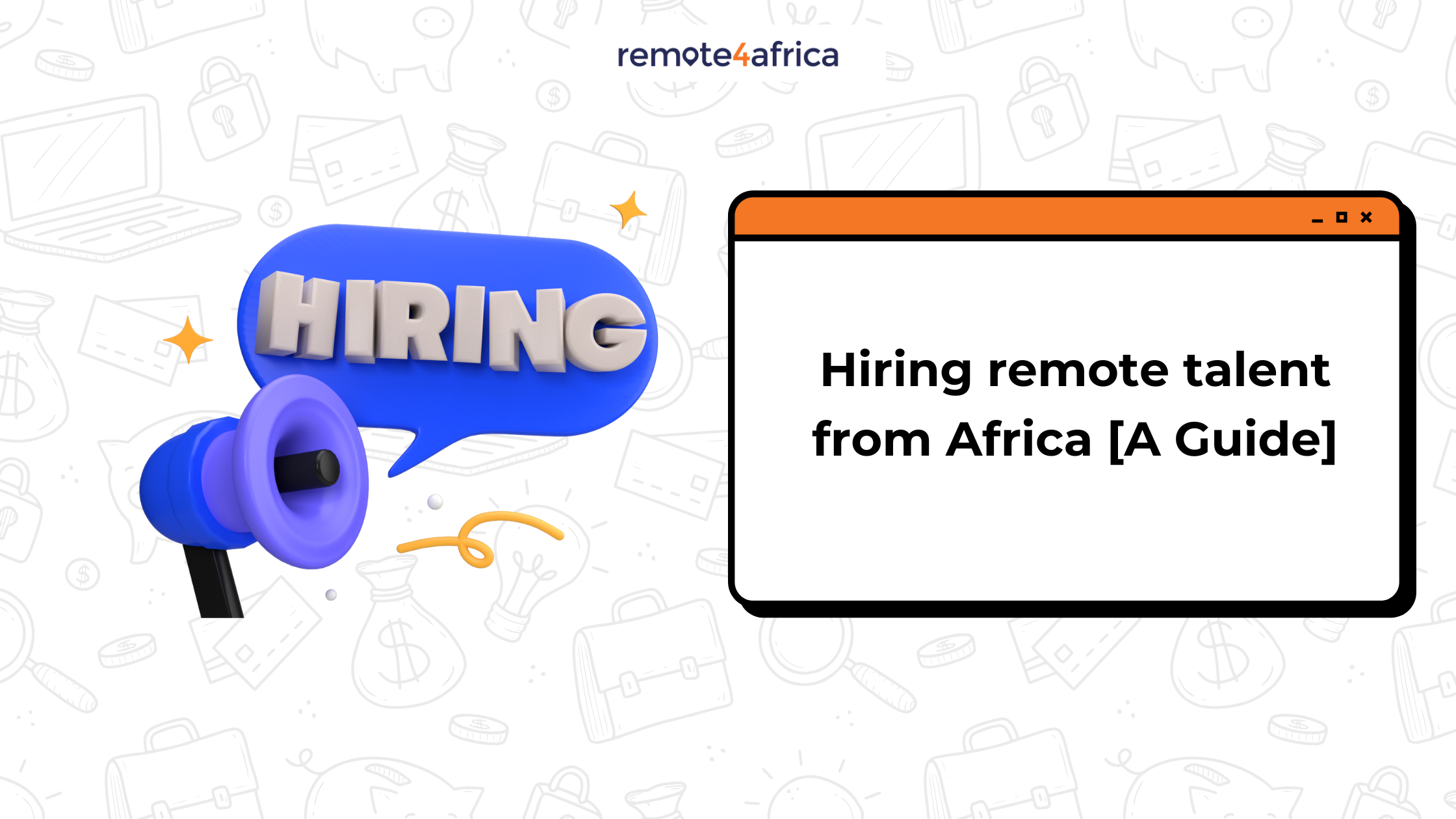A Guide to Hiring Remote Talent from Africa

No matter where you run your business/organisation from, hiring remotely from Africa may be a good idea. More businesses are beginning to tap into African talent.
Why? You may ask.
Let's reel out some of the benefits.
- A diverse talent pool: Africa has the largest and fastest growing young workforce globally. While lots of economies are beginning to see declining population growth rates, Africa boasts nearly 420 million young people aged 15-35 (African Development Bank). With about 70% of Africa's population under 30 it is a no brainer where the bulk of tomorrow's workforce will come from.
- Young, Digitally Savvy Population: With ever increasing internet and smartphone penetration, more African young people have become digitally savvy. We find that for a lot of digital jobs like social media marketing, content writing, product design, virtual support etc Employers find lots of suitable candidates from Africa.
- Language Compatibility: For employers in dominantly English or French speaking markets it is easier to find good candidates from Anglophone or Francophone African countries who can easily communicate with the rest of your team remotely.
- Competitive Pay/Cost Savings: Companies in North America and Europe are able to see significant cost savings from hiring competent remote talent from Africa, while paying above market rate obtainable in the African market. For small and growing companies especially you have to keep an eye on the operating costs
So How Do You Find Remote Talent in Africa
We give a run down on ideas and strategies to help anyone find and recruit the best skilled talent from Africa.
Which Remote Roles are Best Suited to Hire from African Countries
If you decide to hire remote talent in Africa first thing - determine the role to hire remotely.
Some of the best jobs/positions to hire from Africa (you are more likely to find significantly skilled workers in these areas) include;
- Software engineers/developers
- Product designers
- Content writers
- Administrative/Virtual support
- Customer support
- Video editing
- Sales/sales support
- Digital marketing
- Data analysts
Articulate Job Details - key job responsibilities, requirements and success metrics.
Draw up the job details (responsibilities/tasks, requirements) and don’t forget to outline key performance metrics (kpm). These ensure you keep your eyes on the ball (output/results) so instead of micro managing employees you are able to measure/evaluate performance by the set metrics.
Decide Other Important Things Like
- Do you want them to work within a specific time frame, time zone etc?
- Do you want to restrict your recruitment to a specific country or countries? Organisations may do this so they don’t have to deal with the stress of paying remote workers in different currencies etc eg if your organisation is in Kenya you may want to hire remotely from Kenya only so it is easier to pay them in one currency
Casting Your Net Wide to Catch Suitable Applicants
Use region specific remote job sites like Remote4Africa to advertise your vacancies. That way your job ads get significant interest in that region and you can direct them to apply either through your organisation's career page, an ATS or even a Google form.
If you can, post your remote job opening on social media like Linkedin, X (Twitter) etc and promote to target audience.
Utilise your networks to send out details about your remote openings.
What Should Your Application Process be Like?
We find that including some sort of pre-screening tests/questions in your application process helps get you quality candidates faster. Set questions you want applicants to answer to test for basic or high level knowledge. This helps filter out unqualified applicants. You can do this via google forms (or any decent survey tool) or use ATS that fits your purpose
If you set good application screening questions only suitable candidates make it through to the initial pool for your consideration.
Reviewing Applications and Shortlisting
Review CVs and applications of candidates that passed your initial screening. To further weed out unsuitable candidates you may decide to send further pre screening questions via email to this initial batch of shortlisted candidates. We call this the email interview.
This stage of the process should be more case study, situational questions that test the applicant's skills and ability to do the job.
You will find that only a further smaller percentage of applicants respond adequately to the email questions. So you have your final batch of applicants to interview.
Interviewing
Schedule online interviews for your final batch of candidates who scaled your email interview.
You can use any of the several tools available for this - Zoom, Google Meet etc. Schedule dates/time on your calendar and send out invites.
Outline your interview questions ahead of time and work out a grading system for all the things you wish to consider as part of your hiring decision - response to each question, appearance/composure, critical thinking and problem solving, communication skills, attitude and motivation etc.
Make note of your observations for each candidate interview. This helps everyone on the interview panel make impartial decisions as you may not be able to remember everything that transpired during the interview. At the end of the interview(s) compare notes/scores for each candidate and decide the best candidate(s).
You can hire skilled young workers from Africa's major countries on Remote4Africa. We are Africa's top remote job platform with hundreds of thousands of African professionals. Post Your Jobs Here
